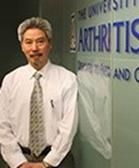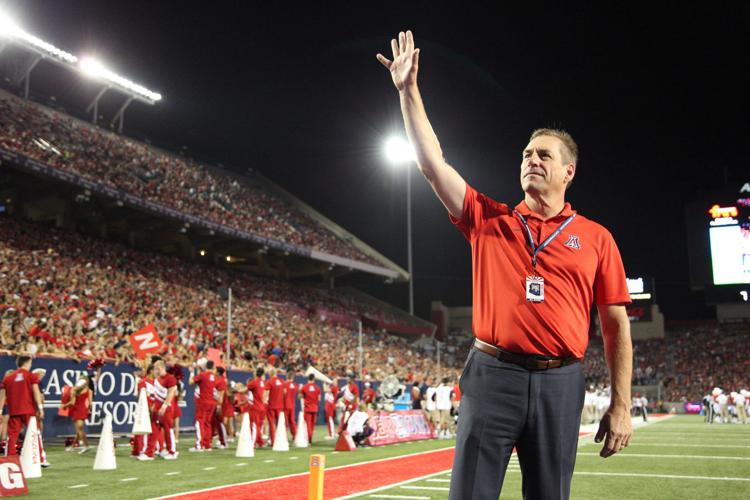The long-time collaboration between the University of Arizona Arthritis Center and Wildcat athletics has been a prescription for fundraising success.
And on May 9, the public can glean insight into the inner workings of both — and kick in support for the arthritis center — at the Bear Down Luncheon.
“Lute Olson paved the way as this unique collaboration began many years ago. For us to contribute our time to help eradicate arthritis as a debilitating disease is a privilege,” said UA athletic director Dave Heeke, guest speaker at the luncheon. “Arthritis affects many that participate in sports throughout their lives. This collaboration is a natural to us, as we see the impact of this disease and the critical need for leading-edge research and education.”
Attendees will have the opportunity to meet Heeke, the UA’s 13th athletic director, who will share his vision for Wildcat sports at the luncheon. They can also learn more about the groundbreaking research, clinical efforts, specialized care and educational outreach backed by faculty, an advisory board and committed volunteers at the arthritis center, which is in the school’s College of Medicine.
“It is exciting to be part of the diverse efforts of the arthritis center. This is a team effort in every sense of the word,” Heeke said.
Among the long-time center volunteers is former City Councilwoman Nina Trasoff.
Trasoff has a history of 30-plus years with the center, dating back to its designation as one of 11 institutions nationwide to receive a Multipurpose Arthritis Center grant from the National Institutes of Health under co-founders Dr. Eric P. Gall and Dr. Robert G. Volz. The center remains the only multidisciplinary center dedicated to arthritis in Arizona and the only one of its kind in the Southwest.
“Each of these men in his own way is a visionary. Each of them understood something decades ago that not many people did, and that was the value and importance of interdisciplinary approaches to problem-solving. ... They looked at how to work together to achieve something that hadn’t been done before with better results for the people they were trying to help,” said Trasoff, who is one of 53 million Americans with osteoarthritis. “The center continues working to solve some of the big questions that were and are out there under (director) Dr. C. Kent Kwoh, who is an internationally-renowned researcher on osteoarthritis.”
While her daily activities are minimally impaired, Trasoff has empathy for those whose lives are changed by arthritis. She is encouraged by the innovative bench-to bedside research and the specialized care at the center, which utilizes specialists in orthopedic surgery, geriatrics, immunology, medical imaging, pharmacology, integrative medicine, epidemiology, public health, exercise physiology, nutritional sciences, podiatry and biomechanics.
“What they are doing is just groundbreaking. ... It is such a creative approach to problem-solving. It is so much fun being part of a group committed to that,” Trasoff said.
On the research front, faculty at the center received two grants from the NIH in 2017. One was for more than $2 million to identify changes on knee MRIs that may indicate disease progression in individuals with early knee osteoarthritis. The second was for more than $800,000 as part of a multi-institutional effort funded by the NIH to predict individuals at risk of opioid overdose and/or abuse.
Other research by Dr. Mohab Ibrahim, an assistant professor of anesthesiology and pharmacology, involves a randomized, double-blind clinical trial to study the effects of LED light on people with migraine and fibromyalgia, one of the more than 100 forms of arthritis and musculoskeletal conditions that often manifest with chronic pain.
Ibrahim and co-presenter Todd W. Vanderah will present “Battling the Opioid Epidemic: UA Experts See the Light through Groundbreaking Research” as part of the center’s Living Healthy with Arthritis lecture series at 6 p.m. May 2 at Banner-University Medical Center. The free lecture is open to the public.
Kwoh said the research into opioid dependence and pain management are particularly timely in light of the country’s opioid epidemic.
“Clearly some people need these medications to manage pain, but we need to do better jobs of identifying those who might abuse or misuse opiates so they can get proper treatment,” Kwoh said. “We also need safer and more-effective treatments for chronic pain associated with conditions such as fibromyalgia and osteoarthritis. The research may offer exciting possibilities.”





